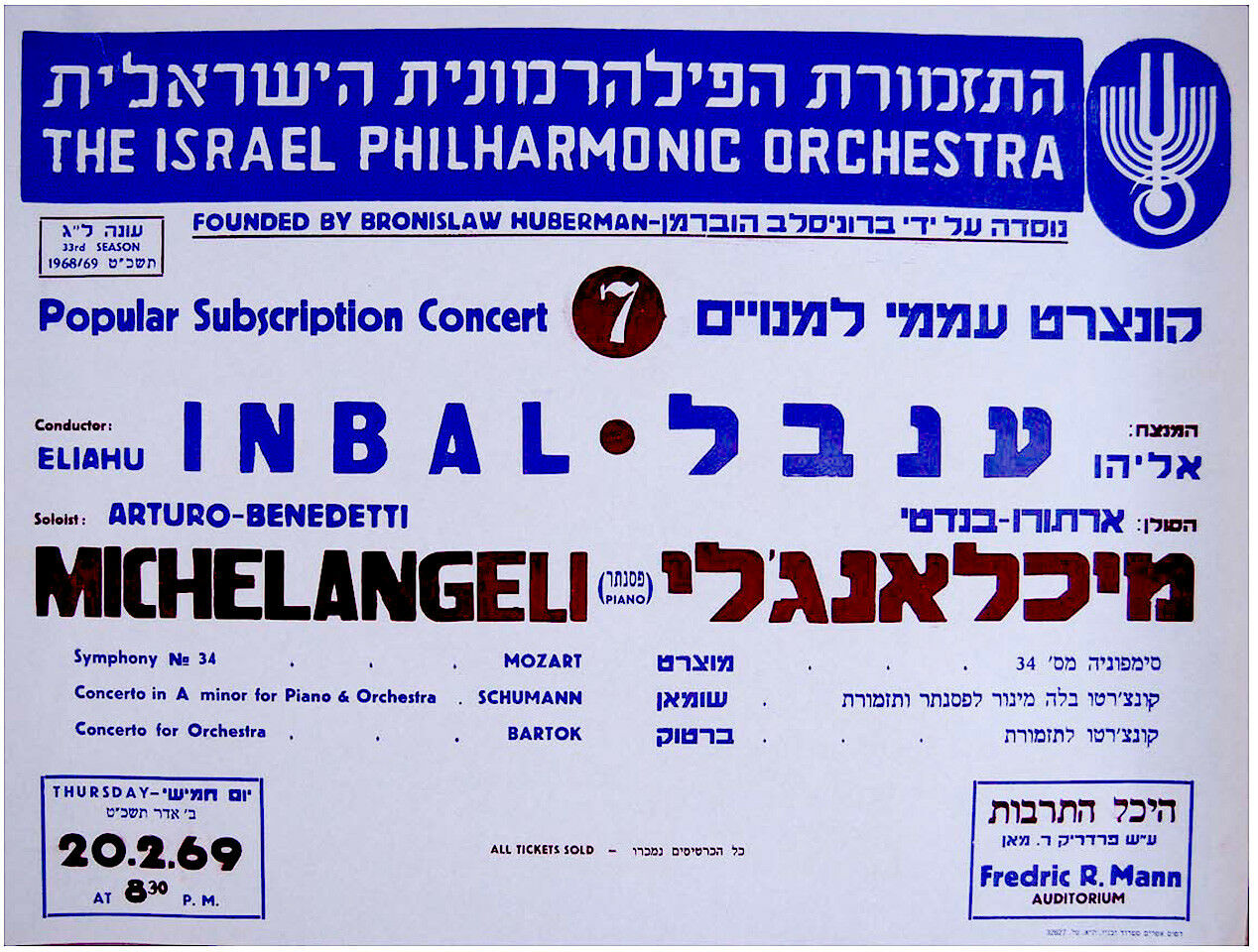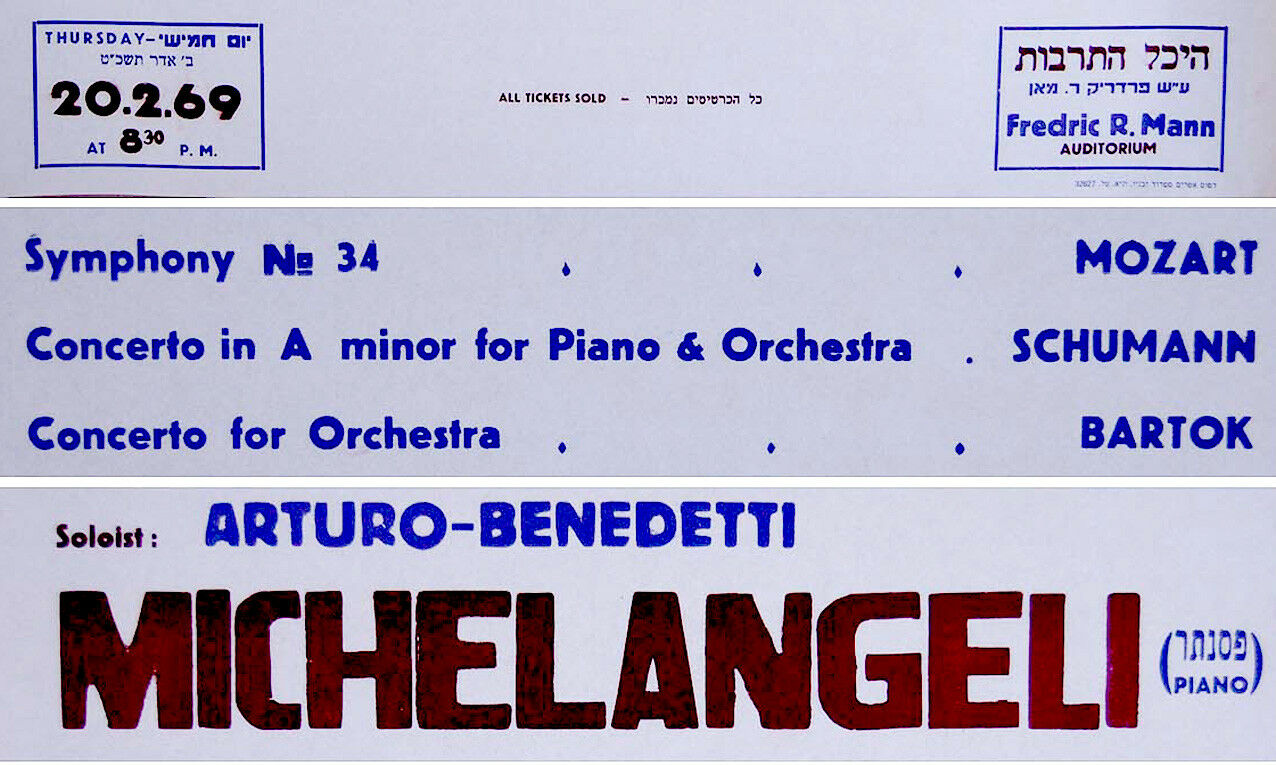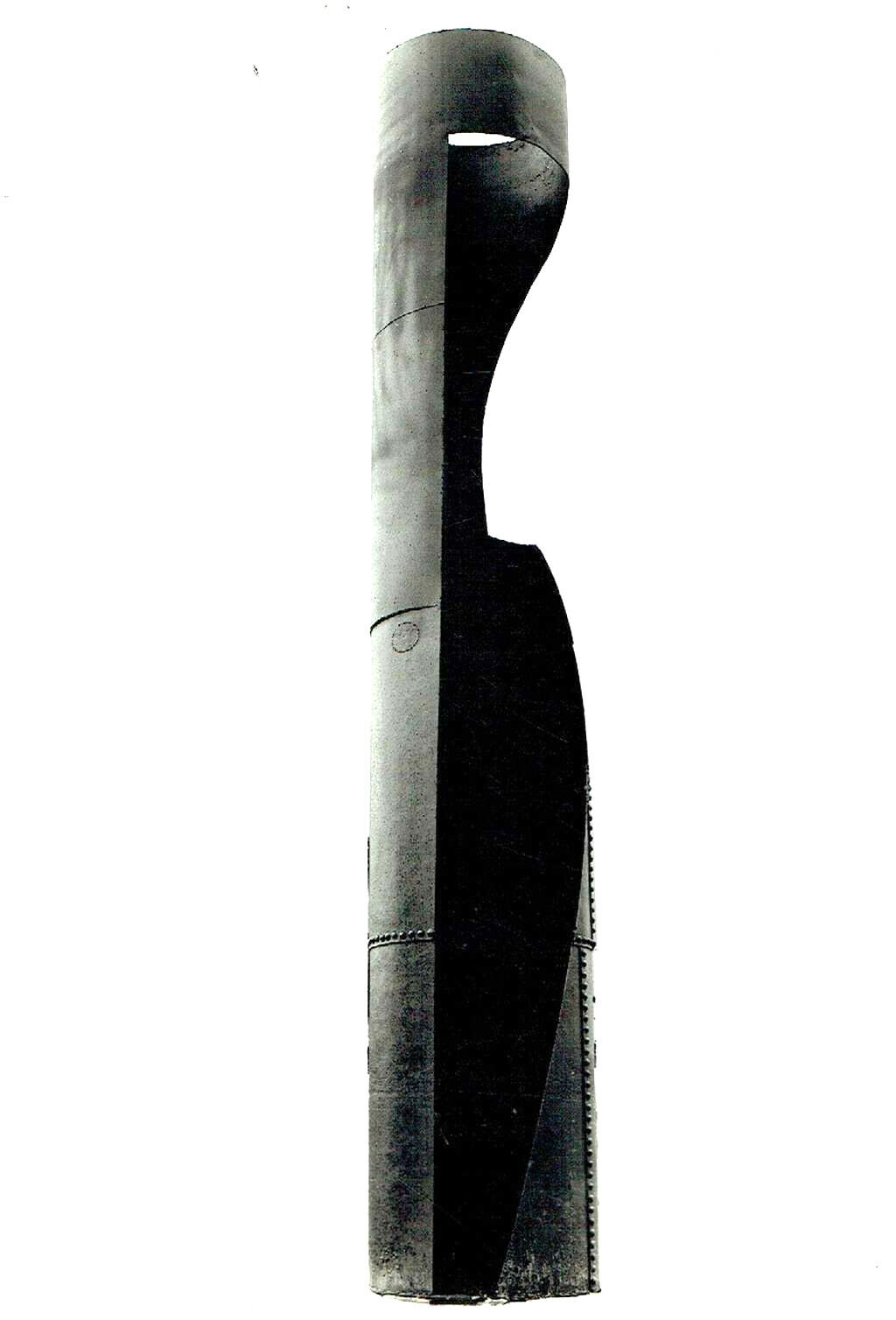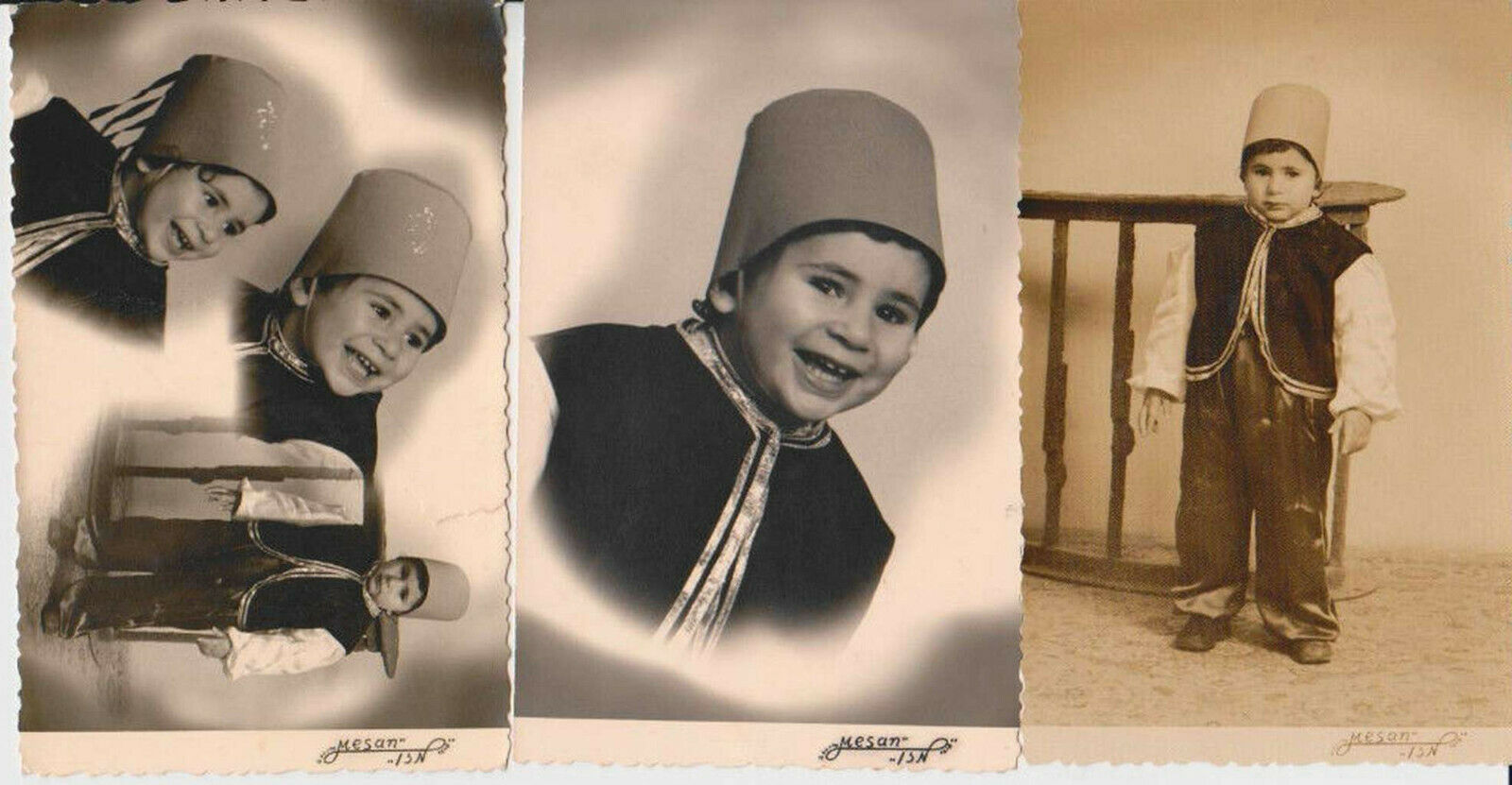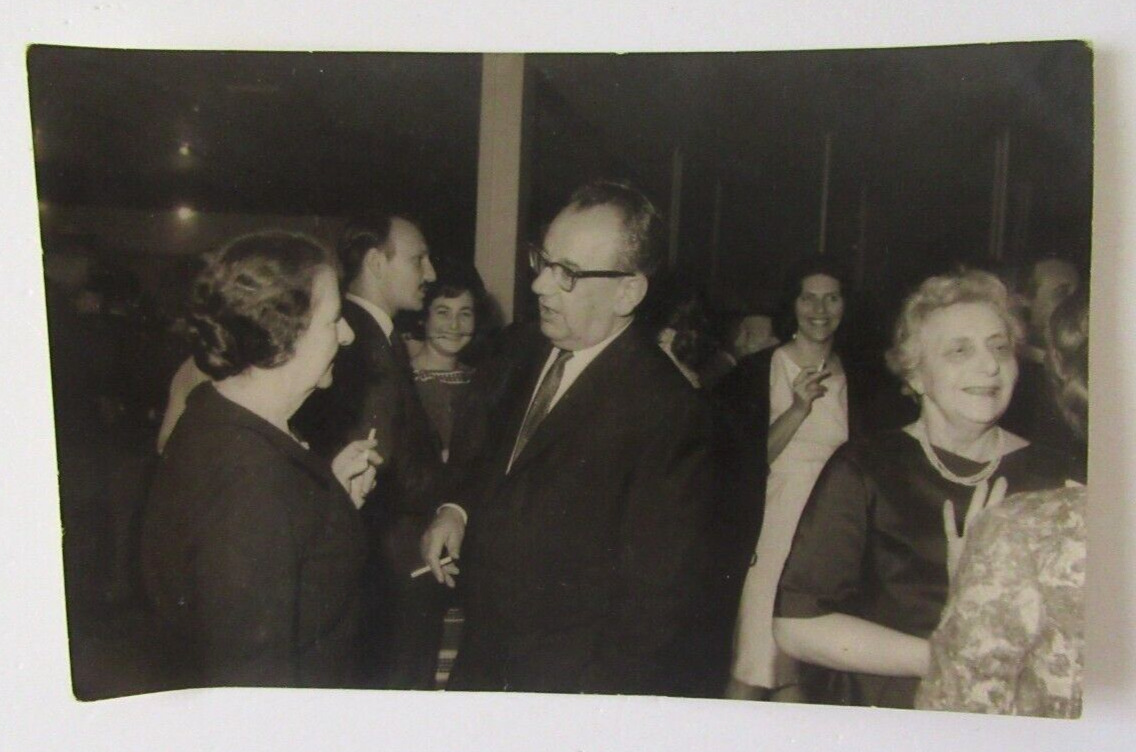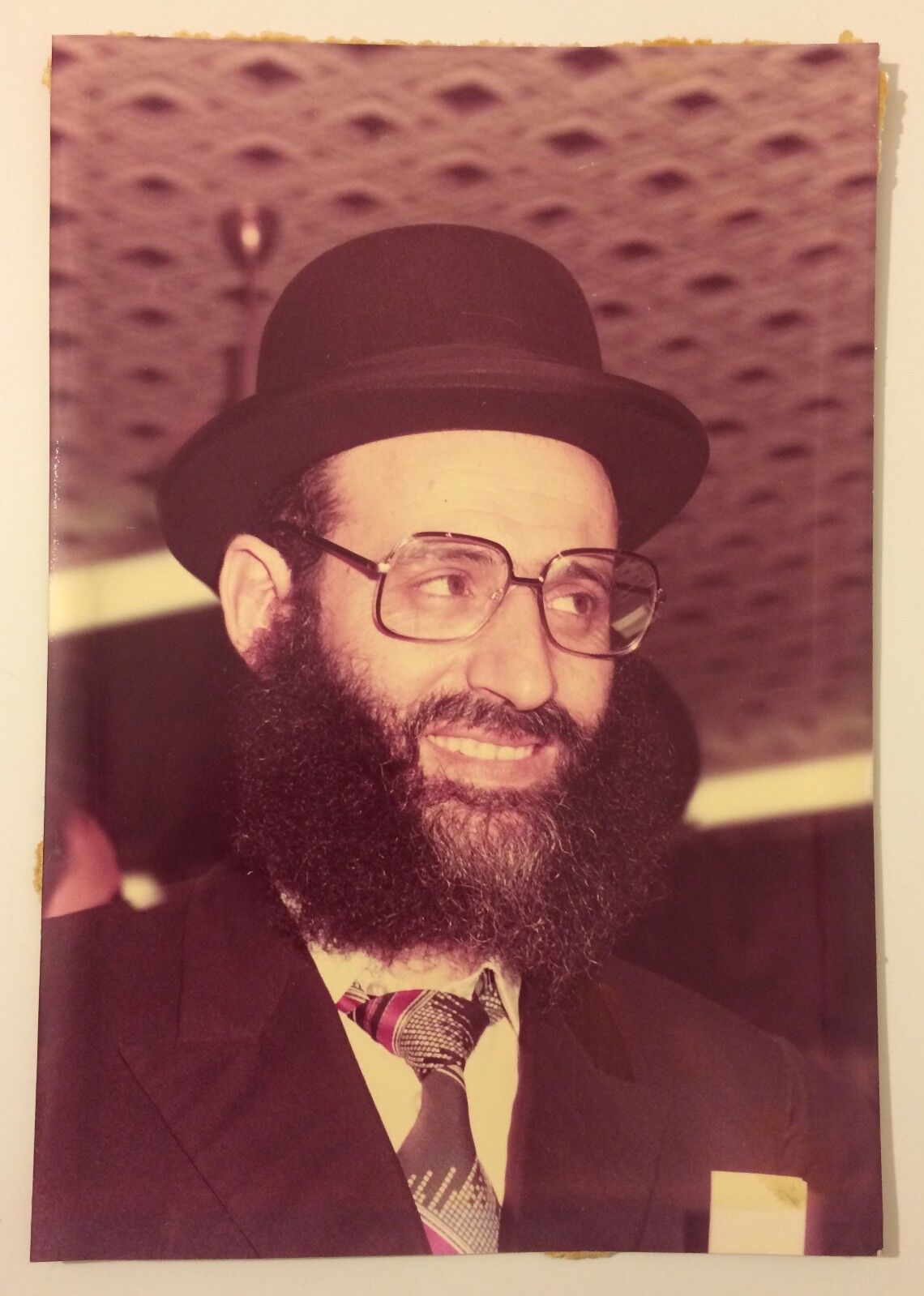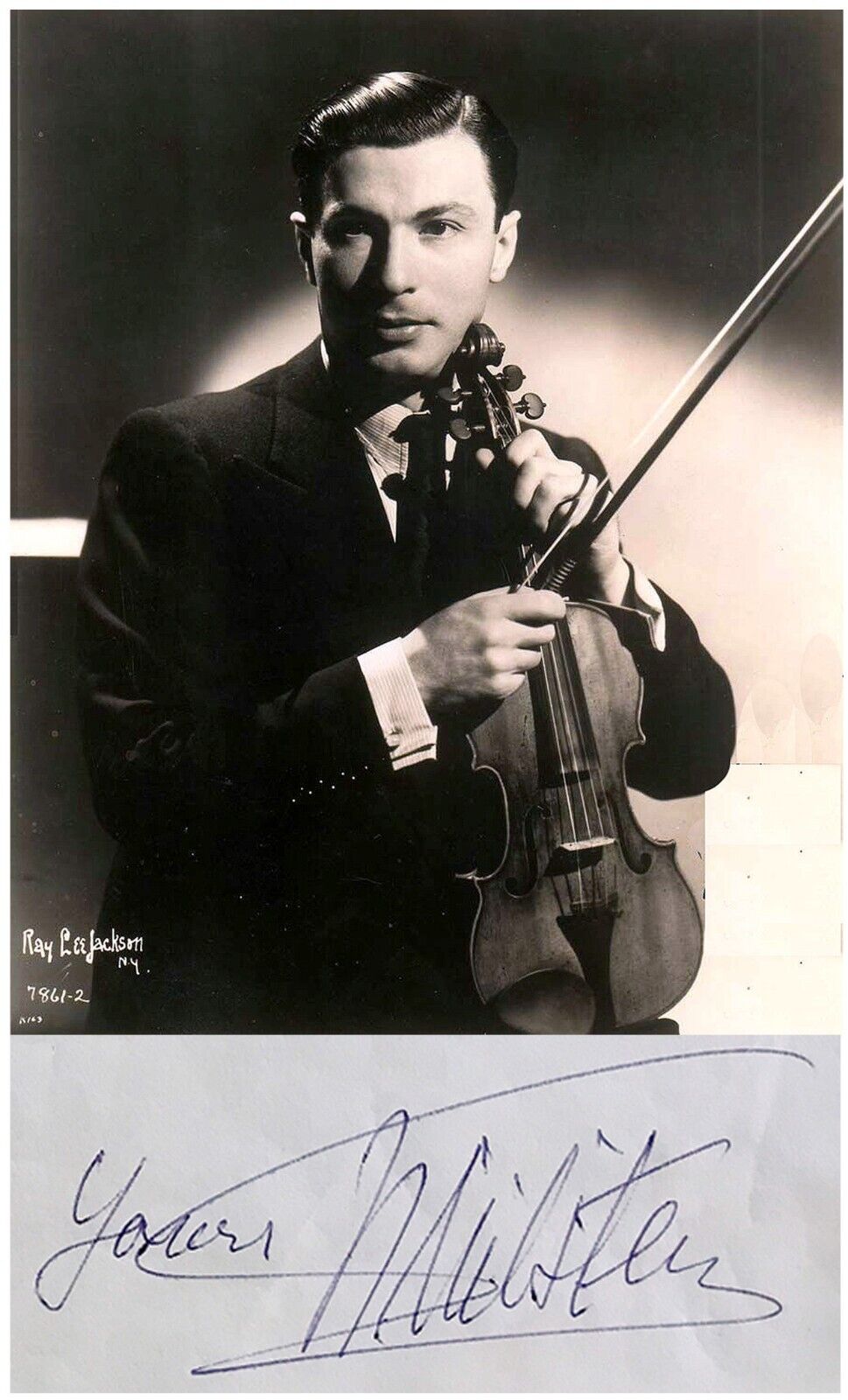-40%
1969 Piano CONCERT POSTER Israel A. BENEDETTI MICHELANGELI Mozart BARTOK Hebrew
$ 71.28
- Description
- Size Guide
Description
DESCRIPTION:
Up for auction is an extremely rare CONCERT POSTER announcing and advertising the upcoming unique historical PIANO performance of the renowned Italian pianist - ARTURO BENDETTI MICHELANGELI . The PIANO CONCERT took place in 1969 in TEL AVIV ISRAEL. ABM was a guest of the IPO. He
played pieces by
MOZART , SCHUMANN and BARTOK with the IPO under the baton of somewhat forgotten Israeli Eliahu Inbal
. Size a
round 27 x 19 " . Hebrew & English. Very good condition . ( Pls look at scan for accurate AS IS images ) Will be sent inside a protective rigid sealed tube .
PAYMENTS
: Payment method accepted : Paypal .
SHIPPMENT
:SHIPP worldwide via registered airmail is $ 25 .
Will be sent inside a protective rigid sealed tube
.
Will be sent around 5 days after payment .
Arturo Benedetti Michelangeli (Italian: [arˈtuːro beneˈdetti mikeˈlandʒeli]; 5 January 1920 – 12 June 1995) was an Italian classical pianist. He is considered one of the greatest pianists of the twentieth century.[1] Contents [hide] 1 Biography 2 Notes 3 References 4 External links Biography[edit] Born in Brescia, Italy, he began music lessons at the age of three, initially with the violin, but quickly switched to the piano. At eleven he entered the Milan Conservatory, graduating three years later at fourteen. In 1938, at the age of eighteen, he began his international career by entering the Ysaÿe International Festival in Brussels, Belgium, where he was placed seventh. (A brief account of this competition, at which Emil Gilels took first prize and Moura Lympany second, is given by Arthur Rubinstein,[where?] who was one of the judges. According to Rubinstein, Benedetti Michelangeli gave "an unsatisfactory performance, but already showed his impeccable technique.") A year later he earned first prize in the Geneva International Competition, where he was acclaimed as "a new Liszt" by pianist Alfred Cortot, a member of the judging panel, which was presided over by Ignacy Jan Paderewski. The music critic Harold C. Schonberg wrote of Benedetti Michelangeli: His fingers can no more hit a wrong note or smudge a passage than a bullet can be veered off course once it has been fired...The puzzling part about Michelangeli is that in many pieces of the romantic repertoire he seems unsure of himself emotionally, and his otherwise direct playing is then laden with expressive devices that disturb the musical flow.[2] On the other hand, the Romanian conductor Sergiu Celibidache always saw in Benedetti Michelangeli a colleague, and not merely another competent pianist: “Michelangeli makes colors; he is a conductor."[citation needed] Celibidache also considered Michelangeli the "greatest living artist".[3] The teacher and commentator David Dubal argued that he was best in the earlier works of Beethoven and seemed insecure in Chopin, but that he was "demonic" in such works as the Bach-Busoni Chaconne and the Brahms Paganini Variations.[4] His repertoire was seemingly strikingly small for a concert pianist of such stature, indeed we know from colleagues and students that he dominated most of the piano repertoire.[5] Owing to his perfectionism, relatively few recordings were officially released during Benedetti Michelangeli's lifetime, but these are augmented by numerous unauthorized recordings of live performances. Discographical highlights include the (authorized) live performances in London of Ravel's Gaspard de la nuit, Chopin's Mazurkas and Sonata No. 2, Schumann's Carnaval, Op. 9 and Faschingsschwank aus Wien, Op. 26 as well as various recordings of Beethoven's Piano Concerto No. 5, Liszt's Piano Concerto No. 1 and Totentanz, and the piano concertos of Robert Schumann, and Edvard Grieg. In addition, his playing of Ravel's Piano Concerto in G and Gaspard de la nuit set standards for those works. His reading of Rachmaninoff's Piano Concerto No. 4 is comparable to that of Rachmaninoff himself. His Debussy series for DG is something of a benchmark, even if it is sometimes accused of being a little unatmospheric ("swimming in cool water," in Dubal's words).[citation needed] He is also credited with the rediscovery of some works of Catalan composer Federico Mompou.[by whom?] As a composer, Benedetti Michelangeli arranged 19 Italian Folksongs a cappella for the Coro della Società Alpinisti Tridentini, a men's chorus from Trent (Italy). A recording of these pieces can be found on the DIVOX music label. As a teacher, his pupils included world-class artists as Maurizio Pollini, Martha Argerich and Ivan Moravec. On 20 September 1943 Benedetti Michelangeli married pianist Giulia Linda Guidetti, who was a pupil of his father. She was a valued counselor and secretary to her husband. She lived quietly, sharing time with her husband at their villa in Bornato, near Brescia, or in Bolzano or Arezzo, and appeared so seldom in public with her husband that hardly anybody knew he was married. They separated in 1970. From 1970 on, his secretary, and later his agent and partner, Marie-José Gros-Dubois, was faithfully near his side. She organized concerts and dates for him, and also presided over his financial affairs. Benedetti Michelangeli reputedly did not enjoy giving concerts. In an interview, Gros-Dubois remembered that he could not believe that his concerts were worth so much money. After a concert, she reported that he gloomily said: "You see, so much applause, so much public. Then, in half an hour, you feel alone more than before."[6] Benedetti Michelangeli was a connoisseur of the mechanics of the piano and he insisted that his concert instruments be in perfect condition.[7] Whenever possible he took his own Steinway piano with him on tour. His last concert (all Debussy) took place on 7 May 1993 in Hamburg, Germany. After an extended illness he died in Lugano, Switzerland. He is buried in nearby Pura.[8] Arturo Benedetti Michelangeli, Reclusive Pianist, Is Dead at 75 By ANTHONY TOMMASINI Published: June 13, 1995 FACEBOOK TWITTER GOOGLE+ EMAIL SHARE PRINT REPRINTS Arturo Benedetti Michelangeli, an acclaimed pianist known for his reclusive behavior, died yesterday in Lugano, Switzerland. He was 75. He had been hospitalized several days ago, according to The Associated Press. Hailed by many critics and musicians as one of the supreme keyboard artists of his time, Mr. Michelangeli was a mysterious figure who zealously guarded his private life. The despair of his managers, he was famous for canceling performances at a moment's notice. He abruptly halted a 1948-49 American tour at midpoint because he felt the show-business atmosphere fostered by American promoters was not conducive to his work. "They wanted me to act as if I was from Barnum's circus," he said at the time. As recently as 1986 Mr. Michelangeli refused to continue a recital in Zurich because fresh air allowed into the hall on the day of the recital had thrown off the tuning of the piano. Critics were divided about Mr. Michelangeli's work, but the one indisputable aspect of his artistry was his supreme technical command. He was a strapping man whose long arms and large hands were as comfortable wrapped around the steering wheel of his Ferrari (he was a three-time competitor in the Mille Miglia road race) as they were taming the keyboard of his Steinway concert grand. (He frequently insisted on having his own piano shipped to the concert hall where he would be performing.) His repertory, which ranged from the keyboard sonatas of Galuppi and Scarlatti through the major keyboard works of Ravel, was not large. But critics praised his clarity, luxurious tone and painterly palette of colors and shadings. His interpretive style was difficult to label. He played with tremendous freedom and individuality, yet his basically Romantic outlook was coupled with a cool intellectual approach that could be severe. Not all of his work was hailed. In 1968, Harold C. Schonberg, the chief music critic of The New York Times, called Mr. Michelangeli's performance of Beethoven's "Emperor" Concerto with the New York Philharmonic "one of the most remarkable that has been heard hereabouts for years." But a few weeks later, writing of the pianist's solo recital, Mr. Schonberg declared that Mr. Michangeli's musical ideas were, "by most current standards, weird." Mr. Michelangeli was born in Brescia, Italy, on Jan. 5, 1920. He began studying the violin at the age of 4, and the organ at 5. At 10 he settled on the piano, and entered the Milan Conservatory. In 1940 he captured first prize in the Geneva Competition, prompting the jury chairman, the celebrated pianist Alfred Cortot, to remark, "In this boy there is some Liszt and Paderewski." During World War II, Mr. Michelangeli served as a pilot in the Italian Air Force, and was captured late in the war by the Germans, who, he later claimed, "hose-whipped" his hands and arms when they discovered he was a pianist. After the war, he taught at the Martini Conservatory in Bologna, and teaching would remain an essential part of his life's work. In later years, his teaching was unconventional and legendary. He rented several castles near his home in Florence, calling each an International Academy. Young pianists would be invited to live there free of charge. Mr. Michelangeli provided private instruction, planned the menus and kept his students to a strict schedule, with practice beginning every morning at 7. Two pianists who revered their work with him were Martha Argerich and Maurizio Pollini. Mr. Michelangeli was married, but little is known of his private life. Arturo Benedetti Michelangeli 1920 - 1995 Arturo Benedetti Michelangeli was born at Orzinuovi, a small town near Brescia, Italy, on January 5, 1920. His father, Giuseppe Benedetti Michelangeli, formerly a lawyer, used to play piano, and gave his son Arturo his first music lessons when the child was but three years old. His mother taught him to read and write. His love for his father was as deep as discrete. During a period when he was ill, Arturo Benedetti Michelangeli, together with other fellow students at the Musical Institute in Brescia, used to travel to a distant restaurant by bicycle where they entertained the clientele in order to make some money and help Benedetti Michelangeli's father. When his parents found out that, his father scolded him angrily, repeating that those were not things to do, and that Arturo had to think only about studying. He was around 14. In Brescia, at the Musical Institute, he also met his future wife, Giuliana Guidetti. Musical studies Arturo Benedetti Michelangeli began to receive regular music lessons at the age of four, at the Musical Institute ``Venturi'' in Brescia, with Paolo Chimeri. At the age of five, he took part in the annual concert together with other pupils from the school. He wore a short skirt, the way children used to do by that time. When he appeared on the stage, he stood up motionless in front of the piano stool for a few seconds, then, without saying a word, he went back behind the scenes. Everybody thought he was afraid, and they pushed him back on the stage. But young Arturo retired a second, then a third more time, without speaking, until someone eventually understood that he just needed some help to raise up on the stool, still too high for him. Then, he began to play quietly, perfectly at his own ease. By that date, a local newspaper reported that Little Arturo Benedetti Michelangeli (first course, M.o Chimeri) excited the most lively astonishment in the audience for a faultless performance of two studies (op. 409) by Czerny. To the readiness to catch the musical sense of what he played, he joined technical sureness and the ability to communicate his feelings through the sounds. The review seemed foretell Arturo Benedetti Michelangeli's whole artistic career. The episode of the stool already revealed single mindedness of his behaviour, a trait which in later years was put down to "a superiority complex." Actually, Benedetti Michelangeli never allowed himself a smile to his applauding audience during his performances: he politely bowed, but his countenance remained cool and unyielding. Applause goes to Beethoven, to Chopin, to Debussy, not to me. I hate when applause is addressed to the pianist, he explained once. Later he continued studying piano and composition in Milan at the Conservatoire, under the supervision of Giovanni Maria Anfossi, one of the most outstanding pianists of the first half of the century, and violin, with Renzo Francesconi. He received his diploma in Milan in 1934, at the age of 14, and immediately began his career as an artist. A life as an artist When Arturo Benedetti Michelangeli was to begin his career as an artist, Europe was slowly sinking into the abyss of the Second World War, and an ever decreasing attention was addressed to music. In 1937 he presented himself to the Italian radio broadcasting agency of that time (EIAR, today's RAI) for audition, but he wasn't engaged. In June 1938, at the age of 18, Arturo Benedetti Michelangeli took part to the Second International Music Contest of Bruxelles, dedicated to the memory of the Belgian violinist Eugène Ysaye. The inaugural competition had been open only to violinists, and it was won by David Oistrakh. Emil Gilels won the second competition, devoted to the piano, and Benedetti Michelangeli came only seventh (first among the Italian competitors). It seems that Rubinstein himself gave poor marks to Benedetti Michelangeli, and that an Italian juror even gave a nought. However, Queen Mother Elizabeth of Belgium, who sponsored the contest, could not help noticing Benedetti Michelangeli's bravura. After a private concert at Court in Lechen, where Benedetti Michelangeli accompanied the Queen Mother, a violinist herself, she awarded the young pianist with a special gift, a pair of cuff-links with diamonds, in the shape of sevens. Seven, she addressed him, will be your lucky number. Queen Mother Elisabeth and Arturo Benedetti Michelangeli remained close friends and often exchanged letters thereafter. The Queen of Italy Maria José, who belonged to the Belgian Royal Family, personally intervened in order to save Benedetti Michelangeli from military service and from the War. However, Arturo Benedetti Michelangeli never wanted to leave Italy during that period, despite crossing the Swiss borders so many times to give concerts. The year after, 1939, Adolf Hitler prepared to invade Poland, and the third Bruxelles Competition did not take place. Neutral Switzerland, however, decided to hold a new International Musical Competition in Geneva. Men and women competed separately, as the pseudo-sportive fashion of that time prescribed, and during each round the artists were separated from the jury's sight by a thick black curtain. They played anonymously, and they were marked by a number only. Arturo Benedetti Michelangeli played with number seven. On that occasion, on July 8, 1939, Arturo Benedetti Michelangeli played Liszt's Concerto No. 1. Alfred Cortot, who was in the jury, exclaimed, A new Liszt is born!, and Arturo Benedetti Michelangeli was proclaimed the winner of the contest. Cortot gave him a photograph of himself, inscribed with the following dedication: To Arturo Benedetti Michelangeli, with all my devote admiration. On that date the legend was born. The newspapers reported enthusiastic comments, and immediately an important Italian gramophone company, La Voce del Padrone, invited him to record for it. Perhaps it was possible that Cortot's comments were over sensational, and other critics were more moderate in their acclaim. A lady, a colleague and competitor of Benedetti Michelangeli's, was reported to say that Cortot's judgement had been probably excessive, since Liszt had been a composer, besides a virtuoso, after all. However, other reviewers, such as Piero Rattalino, agree with Cortot's sensational statement, on the basis of the recording of that Concerto performance, recently found by the Swiss Radio in its archives. First in Europe (Barcelona, 1940; Berlin, 1946), then in the United States (1948), and finally in Asia, Benedetti Michelangeli was acclaimed by a wide variety of audiences, and praised by the sternest critics. His activity in the recording studio continued also with the German Telefunken. In 1949, he was chosen as the official pianist for the events organized in Poland and several other countries in order to celebrate the centenary of Chopin's death. In 1957, the Iron Curtain notwithstanding, he was in Prague. On April 28, 1960, Arturo Benedetti Michelangeli gave Beethoven's Concerto No. 5 Op. 73 Emperor, in the Vatican City, at the presence of H.H. Pope John XXIII. His particular bond with the Church of Rome and his admiration towards that Pope, moreover a native of his own land, was later testified by two further concerts in the Vatican, some of which even took place during his voluntary exile from Italy. In the same year (1960) he awarded the G.B. Viotti Golden Prize in Vercelli, Italy. In 1962 he accepted to record a series of eight concerts in Turin for RAI, the Italian broadcasting corporation. Although in black and white, although Benedetti Michelangeli gave strict instructions not to frame him directly and other such restrictions, nowadays these recordings form an invaluable documentary source of his art and his technique. Apart from his usual reserve in allowing the TV cameras to spy the artist's intimate labour from close up, he used to repeat that he did not care about the image, and that the sound only really mattered to him. His unfathomable countenance was once defined the face of silence (Bruno Barilli). However, as it usually happens, they were probably never addressed with the attention they would deserve. In 1964, during his first concert in the Soviet Union, at Moscow Conservatoire, the public was double than the seats allowed. The reviewers, usually quite severe, reported that the listeners were in a frenzy, and commented about the extraordinary range of his talent, the perfection of his taste and the extraordinary richness in his sound. In 1965, his first tour in Japan excited enthusiasm in the oriental audience. Arturo Benedetti Michelangeli had an artisan's concept of his job of pianist. To play, he used to say, means labour. It means to feel a great ache in the arms and in the shoulders. He practiced up to eight, ten hours per day, in quest for an equilibrium between the long for the sound effects that the instrument cannot yield and the sensitiveness that allows one to steal the maximum from it nonetheless, as he used to say to his disciples. He used to work on a piece until it was technically perfect, then he began to think about its interpretation. He stopped practicing just a couple of days before the last rehearsal, not to go on the stage with his hands and his mind tainted by the mechanics of exercise. As the years passed by, his extreme sensibility of touch transformed into an absolute equilibrium of the pianistic colours. Together with few other exceptional pianists, Arturo Benedetti Michelangeli stretched the pianistic technique to extreme limits, and it is inconceivable that one could do more both in precision, elegance, and powerfulness. He did not love his life as a concert artist, however. His wife, Giuliana Guidetti, was his agent. She organized concerts and dates for him, and also presided over his financial affairs. In a recent interview, she remembered that her husband could not believe that his concerts were worth so much money. After a concert, she reported that he gloomily said: You see, so much applause, so much public. Then, in half an hour, you feel alone more than before. His Last Years In 1968, after the record firm BDM, where Arturo Benedetti Michelangeli was a partner, went bankrupt, the Italian authorities sequestrated two of his pianos. He never forgave Italy for such an outrage. Even if he never changed his official place of residence as Bolzano, he left Italy in a voluntary exile, and established his residence first in Zürich, and later in the Canton Ticino, Switzerland, since 1970. In the last years, since August 1979, he occupied a small villa at Pura, near Ponte Tresa. His house was acoustically isolated: nobody could even listen to him from outside. Was that another tribute to his maniacal long for privacy and solitude? (On the contrary, Glenn Gould was a fine neighbour. He even used to organize small amateur concerts with his neighbours in Canada.) He made only a few official entrances back into Italy, allowing a concert in April 1977 in the Vatican City, in the Sala della Benedizione, which is in fact abroad with respect to Italy, and again in the Vatican City, in June 1987, in the Sala Nervi, upon invitation of Pope Paul VI, for a memorable performance for the benefit of the Order of Malta, another concert in 1980, in Brescia, his birthplace, in memory of his countryman Pope John XXXIII, and again in the Vatican, in 1987. He arrived to publish an advertisement in the London Times in 1993, at his own expenses, to cancel four announced concerts, since the organizers had allowed some eighty Italian people to buy tickets. His last public concert was in London, in 1990. On October 17, 1988, during a concert in Bordeaux, while the performance of Debussy's Ondine, he fell on the keyboard for an aneurism at the aorta. However, the year after he was again on the stage, giving concerts and recording as well. He died in Lugano, Switzerland, seven years later, on June 12, 1995, from a chronic illness. According to his will, neither the cause nor the exact hour of his death were to be made known. He is buried in the small cemetery of Pura, near Lugano, under no tombstone. Throughout his life this inimitable and unclassifiable pianist of genius remained faithful to his very high conception of Music. Arturo Benedetti Michelangeli, who cultivated perfectionism pushed to the extreme, will most certainly be remembered as the incarnation of intellectual honesty. ebay1680
